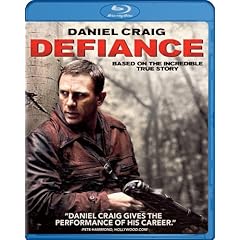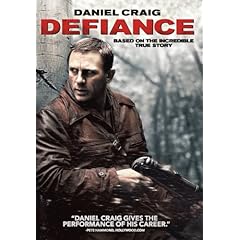

Of course, it wouldn’t be an Oscar season without a WWII drama, and this year Hollywood brings us two, each fueled with a bit of audience-drawing action. Bryan Singer's no-nonsense Valkyrie succeeds by hewing closely to the facts of its story, a foregone-conclusion narrative that's nonetheless engrossing enough. Edward Zwick’s Defiance takes a yet less familiar story, but ties itself in knots trying to reconcile the truth with the demands of commercial cinema.
Though Defiance certainly simplifies and fudges, the broad strokes of the script effectively communicate the remarkable resistance of the Bielski partisans, a movement associated with the four Jewish brothers who initiated it (Tuvia, Zus, Asael and Aron). The ragtag but impressive refugee effort used the cover of a Belarus forest effectively to hide from the Nazis, who in 1941 invaded Belorussia and began slaughtering Jews. As the film depicts, Tuvia Bielski (Daniel Craig) commanded their encampment, a model of efficiency under the most trying of conditions. In real life, priority one was to disappear into the forest, with armed food raids conducted as necessary and offensive action against the Germans and local collaborators—sometimes in concert with Russian partisans—a rarity (said the real-life Tuvia: "To save a Jew is much more important than to kill Germans!"). Unfortunately, skilled hiding isn’t very exciting, so for the sake of the audience, Zwick carefully incorporates some hyped-up action standoffs, the last being an unfortunately laughable stretch of credibility.
Zwick builds much of the drama around a stiff-jawed and unconvincing conflict between Tuvia and Zus (Liev Schreiber), who's depicted as a fiery proponent of offensive action. Zus puts it bluntly to Tuvia: "You don't have the stomach to do what must be done." In rubbing out the man who killed his father and others who get in the way, Tuvia proves his toughness, but the fallout sits uneasily ("I can still see their faces"); instead of focusing on assaults, Tuvia rededicates himself to protecting the growing numbers of refugees in the face of the enemy, brutal cold and ever-dwindling resources . In one of several addresses to his "troops," Tuvia exhorts, "We must not become like them!...Our revenge is to live." With equal drive for his own imperative, Zus eventually breaks away to join the Red Army, while Jamie Bell's Asael remains to serve the forest encampment. (In real life, Asael was older than Zus, but never mind—and Aron, played by fifteen-year-old George MacKay, isn't much of a factor.)
Working from the nonfiction source Defiance: The Bielski Partisans by Nechama Tec, Zwick and Frohman shape the long midsection of their narrative around the emergence of a new form of proud cultural community and the moral and ethical situations that arise within it: when killing is justified, how to administer shrinking rations, whether or not babies can be allowed in the secret refugee camp (a new custom of "forest husbands" and "forest wives" emerges). There's also a rhetorical tug-of-war between Tuvia and local Jewish elders, who are skeptical of rumored "death camps" and Russian partisans ("They're as bad as the Germans," says Mark Margolis' Elder. "You're too young to remember the pogroms"). As Tuvia's old teacher and an intellectual who must prove himself to be of use, Allan Corduner and Mark Feuerstein carry the flag for reason, philosophy, and faith as Tuvia—positioned as Moses in one of many Biblical allusions—leads the wanderers deeper into the dense forest.
Blonde, blue-eyed Craig is certainly unconventional casting for Tuvia, but the acting chops of the three leads go some way to making Defiance’s death-march tone palatable, as does the fine lensing by Eduardo Serra on location in Lithuania. But when the film isn't blandly bleak, it can be corny, never more so than in a climax that feels like an outtake from Tropic Thunder. It’s a shame Zwick—no doubt acquiescing to studio mandate—undermines himself with Hollywood instincts (much as he did with The Last Samurai); with a more subtle, independent sensibility, Defiance could have located a greater truth and integrity.

|
|
 |
The stylized look of Defiance makes its way to Blu-ray in a pixel-perfect transfer from Paramount. That look is defined by a slightly hot contrast and a blue tint that mutes the color scheme. Despite these factors, this image has a surprising amount of pop and certainly looks just as the film did when I saw it in a state-of-the-art auditorium. Much the same way, an aggressive Dolby TrueHD 5.1 mix has the immersive potency I recall from the film's theatrical exhibition.
The Blu-ray includes commentary by director Edward Zwick, always a thoughtful and thorough commentator. That's also apparent in "Defiance: Return to the Forest" (26:05, HD), which includes plenty of footage from the location shoot and interviews with Zwick, Daniel Craig, Jamie Bell, Liev Schreiber, co-producer/co-screenwriter Clayton Frohman, producer Pieter Jan Brugge, Mark Feuerstein, Tomas Arana, Jodhi May, Alexa Davalos, make-up and hair designer Trefor Proud, costume designer Jenny Beavan, dialogue coach Neil Swain, supervising armourer Nick Jeffries, Mia Wasikowska, George MacKay, Iben Hjejle, and special effects coordinator Neil Corbould.
"Children of the Otriad" (13:42, HD) includes Bielski family photographs and home movies, as well as new footage of the family exploring their roots. Interviewed are Tuvia Bielski's granddaughter Sharon Rennert, Tuvia's sons Robert and Michael Bielski and daughter Ruth Bielski, Zus Bielski's son Zvi Bielski, Zwick, and Frohman.
"Scoring Defiance" (7:00, HD) takes us into the scoring session with Zwick, composer James Newton Howard, violinist Joshua Bell, and editor Steven Rosenblum.
"Bielski Partisan Survivors" (1:58, HD) is a photo montage of contemporary survivors, set to film score.
Lastly, the disc includes "Theatrical Trailer 1" (2:05, HD) and "Theatrical Trailer 2" (2:28, HD).
 |